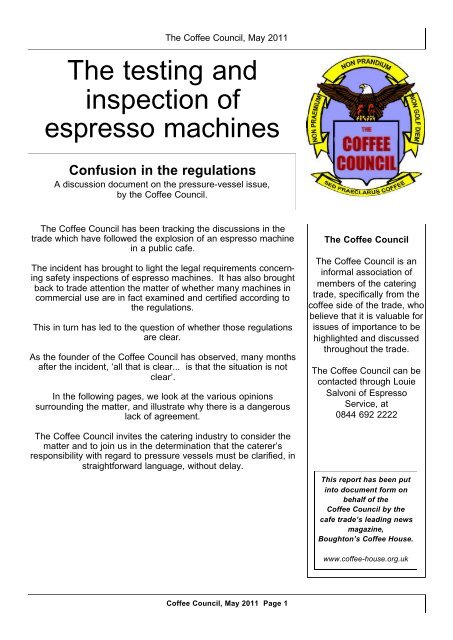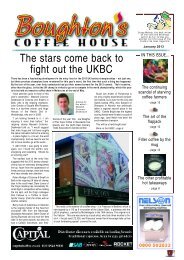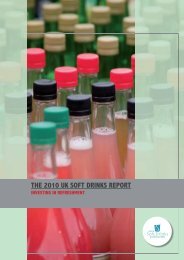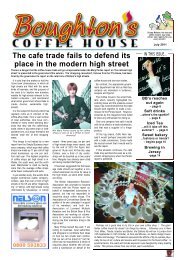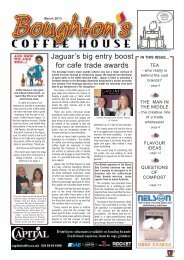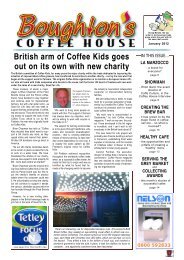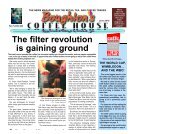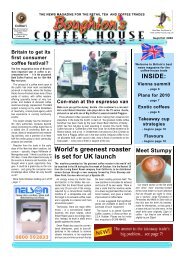The testing and inspection of espresso machines - Boughton's ...
The testing and inspection of espresso machines - Boughton's ...
The testing and inspection of espresso machines - Boughton's ...
- No tags were found...
You also want an ePaper? Increase the reach of your titles
YUMPU automatically turns print PDFs into web optimized ePapers that Google loves.
<strong>The</strong> C<strong>of</strong>fee Council, May 2011<strong>The</strong> <strong>testing</strong> <strong>and</strong><strong>inspection</strong> <strong>of</strong><strong>espresso</strong> <strong>machines</strong>Confusion in the regulationsA discussion document on the pressure-vessel issue,by the C<strong>of</strong>fee Council.<strong>The</strong> C<strong>of</strong>fee Council has been tracking the discussions in thetrade which have followed the explosion <strong>of</strong> an <strong>espresso</strong> machinein a public cafe.<strong>The</strong> incident has brought to light the legal requirements concerningsafety <strong>inspection</strong>s <strong>of</strong> <strong>espresso</strong> <strong>machines</strong>. It has also broughtback to trade attention the matter <strong>of</strong> whether many <strong>machines</strong> incommercial use are in fact examined <strong>and</strong> certified according tothe regulations.This in turn has led to the question <strong>of</strong> whether those regulationsare clear.As the founder <strong>of</strong> the C<strong>of</strong>fee Council has observed, many monthsafter the incident, ‘all that is clear... is that the situation is notclear’.In the following pages, we look at the various opinionssurrounding the matter, <strong>and</strong> illustrate why there is a dangerouslack <strong>of</strong> agreement.<strong>The</strong> C<strong>of</strong>fee Council invites the catering industry to consider thematter <strong>and</strong> to join us in the determination that the caterer’sresponsibility with regard to pressure vessels must be clarified, instraightforward language, without delay.<strong>The</strong> C<strong>of</strong>fee Council<strong>The</strong> C<strong>of</strong>fee Council is aninformal association <strong>of</strong>members <strong>of</strong> the cateringtrade, specifically from thec<strong>of</strong>fee side <strong>of</strong> the trade, whobelieve that it is valuable forissues <strong>of</strong> importance to behighlighted <strong>and</strong> discussedthroughout the trade.<strong>The</strong> C<strong>of</strong>fee Council can becontacted through LouieSalvoni <strong>of</strong> EspressoService, at0844 692 2222This report has been putinto document form onbehalf <strong>of</strong> theC<strong>of</strong>fee Council by thecafe trade’s leading newsmagazine,Boughton’s C<strong>of</strong>fee House.www.c<strong>of</strong>fee-house.org.ukC<strong>of</strong>fee Council, May 2011 Page 1
Pressure Vessels - the C<strong>of</strong>fee Council, May 2011It is widely believed in the c<strong>of</strong>fee trade that very few <strong>espresso</strong> <strong>machines</strong>are inspected in accordance with the law.<strong>The</strong>re are various opinions as to whether this is because many cateringoperators simply do not know that there are requirements surrounding<strong>espresso</strong> <strong>machines</strong>, or whether they consciously choose not to complywith the regulations <strong>and</strong> requirements.It is also widely believed that there are certain confusions about who is, <strong>and</strong>who is not, allowed to inspect <strong>and</strong> certify an <strong>espresso</strong> machine. This has led todisagreement <strong>and</strong> confusion regarding the effect on a caterer's insurance protection.As at May 2011, it is known to the C<strong>of</strong>fee Council that certain appropriateauthorities have consulted experienced people in the c<strong>of</strong>fee trade on the subject<strong>of</strong> safety examinations <strong>and</strong> certifications <strong>of</strong> <strong>espresso</strong> <strong>machines</strong>.It is possible that this work currently being done may result in a more generalappreciation <strong>of</strong> the situation among those in the catering trade who use<strong>espresso</strong> <strong>machines</strong> in their business, <strong>and</strong> clarification <strong>of</strong> how examinationsmay be carried out.For the moment, the only thing that is certain is that a great deal <strong>of</strong> confusion<strong>and</strong> disagreement exists.In the following pages, we examine how the situation has arisen.This is, fortunately, a very rarepicture – very few people haveever seen anything like this,<strong>and</strong> we all trust that it will neverbe seen again. Many people inthe c<strong>of</strong>fee trade say they canrecall only two such incidentsin the last twenty years.<strong>The</strong> item in the picture wasonce an expresso machine.We think this picture illustrateswhy the C<strong>of</strong>fee Council thinkthis matter is worth seriousthought by all who work withsuch equipment.Pic: source unknown<strong>The</strong> situation is not yet clear or resolved. However, until it is, the C<strong>of</strong>feeCouncil suggests that it is in the interest <strong>of</strong> every c<strong>of</strong>fee-house operator <strong>and</strong>general caterer to appreciate that a legal requirement regarding <strong>espresso</strong><strong>machines</strong> does exist, <strong>and</strong> that it is in a caterer's own interests to review the situation<strong>and</strong> assure themselves that they are legally covered, to the satisfaction<strong>of</strong> their insurer.*1. <strong>The</strong> general situation, <strong>and</strong> how it came to attention at the present time.In the autumn <strong>of</strong> 2010, an <strong>espresso</strong> machine exploded in a supermarket caféin Hampshire, resulting in hospital treatment for several people. <strong>The</strong> identity <strong>of</strong>the café, the machine br<strong>and</strong>, or the supplier are all irrelevant to this document,but within the c<strong>of</strong>fee trade, the matter is generally known as 'the Sainsbury'sexplosion'.This brought to attention the matter <strong>of</strong> the pressure-vessel regulations, which ingeneral cover the majority <strong>of</strong> <strong>espresso</strong> <strong>machines</strong> likely to be found in a commercialcatering situation. <strong>The</strong>se regulations say (<strong>and</strong> we are generalising <strong>and</strong>speaking broadly here) that a commercial <strong>espresso</strong> machine must be inspectedregularly, in a stipulated manner. It is widely believed that the appropriateperiod between <strong>inspection</strong>s is one year. <strong>The</strong> <strong>inspection</strong> is referred to as 'awritten scheme <strong>of</strong> examination', the phrase meaning that the certification documentsets out what was examined, <strong>and</strong> how.This in turn brought to general attention the question <strong>of</strong> how an <strong>inspection</strong> iscarried out, <strong>and</strong> who is qualified to do it.*C<strong>of</strong>fee Council, May 2011 Page 2
Pressure Vessels - the C<strong>of</strong>fee Council, May 2011In Boughton’s C<strong>of</strong>fee House magazine in the autumn <strong>of</strong> 2010, theC<strong>of</strong>feetech company, a very experienced name in <strong>espresso</strong> engineering,brought up a new angle on the matter <strong>of</strong> <strong>espresso</strong>-machine<strong>inspection</strong>s - the question <strong>of</strong> exactly who is qualified <strong>and</strong> permitted toundertake such an <strong>inspection</strong>. It was suggested that any <strong>espresso</strong>engineering company which undertakes the general servicing <strong>of</strong> acaterer's <strong>espresso</strong> machine cannot also be the person who inspects<strong>and</strong> certifies that machine, for fear <strong>of</strong> a conflict <strong>of</strong> interest.<strong>The</strong>refore, the actual <strong>inspection</strong> <strong>of</strong> the <strong>espresso</strong> machine has to beh<strong>and</strong>led by an independent inspector, referred to in some regulationsas the 'competent person'.It was subsequently observed that this causes administrative problems<strong>and</strong> expense for every caterer – they have to arrange for anindependent inspector to assess their machine, <strong>and</strong> also to have theirnormal engineer on h<strong>and</strong> to open the machine up for the inspector,<strong>and</strong> put it together again after the <strong>inspection</strong>. This effectively requirestwo bodies to be paid, <strong>and</strong> an amount <strong>of</strong> organisational work to getthem both on the premises at the same time.<strong>The</strong> raising <strong>of</strong> this subject to general trade attention resulted in a fairamount <strong>of</strong> activity.<strong>The</strong> Association <strong>of</strong> Espresso Engineers entered into an agreementwith a third-party <strong>inspection</strong> house, <strong>and</strong> announced that it could nowh<strong>and</strong>le all the organisation <strong>and</strong> paperwork involved in getting the<strong>espresso</strong> engineer <strong>and</strong> the 'competent person' on site at the sametime. <strong>The</strong> caterer would simply receive one overall invoice <strong>and</strong> befree <strong>of</strong> the organisational hassle.*<strong>The</strong> incident in aHampshire cafe broughtto general attention thewidely-held belief thatcafé operators either donot know <strong>of</strong> theregulations, orchoose toignore them.It was subsequentlyobserved that machine<strong>inspection</strong>s causeadministrative problems<strong>and</strong> expense for everycaterer – they have toarrange for anindependent inspector toassess their machine, <strong>and</strong>to have their normalengineer on h<strong>and</strong> to openit up for the inspector, <strong>and</strong>put it together again afterthe <strong>inspection</strong>.This effectively involvestwo bodies to be paid, <strong>and</strong>an amount <strong>of</strong>organisational work toget them bothon the premisesat the same time.*This was followed by the creation <strong>of</strong> Espress Test, a company inCornwall formed by Mark Allen, an <strong>espresso</strong> engineer. He set up tobecome a 'competent person' specialising in <strong>espresso</strong> <strong>machines</strong>.He said that while a caterer's usual <strong>espresso</strong> engineer was notallowed to be the 'competent person', the regulations permitted thereverse - that is, the 'competent person' could be someone qualifiedin <strong>espresso</strong> work, which meant they could open up the machine forthemselves <strong>and</strong> put it back together after the <strong>inspection</strong>, thus savingthe caterer a lot <strong>of</strong> organisation, <strong>and</strong> the requirement to pay for thetime <strong>of</strong> two people.This was all disputed by another independent engineering company,who said that they had been told by the Health <strong>and</strong> Safety Executivethat a caterer's normal <strong>espresso</strong> engineer could indeed serve as the'competent person'.<strong>The</strong> current situation, then, is that there is disagreement in the trade.Is it, or is it not, acceptable for an everyday <strong>espresso</strong> engineer whoworks on a client's machine, to then inspect <strong>and</strong> certify that machine?This is considered an important distinction. In the event <strong>of</strong> anC<strong>of</strong>fee Council, May 2011 Page 3
Pressure Vessels - the C<strong>of</strong>fee Council, May 2011accident, if the caterer has employed the wrong person to inspect<strong>and</strong> certify the machine, their insurance company could declare theircover to be void.2. What the engineers said:<strong>The</strong> following items all come from C<strong>of</strong>fee House magazine, whichappears to have been the only trade magazine to cover the issue.<strong>The</strong> report which first brought the matter to general attention saidthis:C<strong>of</strong>feetech warned café owners not to take short cuts on the matter,<strong>and</strong> to be very careful about how their <strong>inspection</strong>s are done - it iswidely suggested that not all those who <strong>of</strong>fer <strong>inspection</strong> services arequalified to do so. Specifically, a cafe operator's normal <strong>espresso</strong>engineer may not be allowed to inspect <strong>and</strong> certify the machine."Parts <strong>of</strong> the appropriate Act are ambiguous," says Duncan Gaffney<strong>of</strong> C<strong>of</strong>feetech. "This is true <strong>of</strong> the requirement to have tests <strong>and</strong>assessments carried out by a 'competent person' - the Act itself doesnot define the necessary qualifications <strong>of</strong> a 'competent person'.However, the Health & Safety Executive's own Approved Code <strong>of</strong>Practice is explicit in doing so."I emphasise this because there is much confusion in the market. Wesee various companies <strong>and</strong> some very experienced self-employedengineers promoting boiler <strong>inspection</strong> <strong>and</strong> maintenance services. Butdo they satisfy the qualification criteria, <strong>and</strong> are they suitably independent?In most cases the answer is 'no'."Parts <strong>of</strong> the appropriate Actare ambiguous... this is true <strong>of</strong>the requirement to have tests<strong>and</strong> assessments carried outby a 'competent person' – theAct itself does not define thenecessary qualifications <strong>of</strong> a'competent person'. However,the Health & SafetyExecutive's own ApprovedCode <strong>of</strong> Practice is explicit indoing so."I emphasise this becausethere is much confusion in themarket. We see various companies<strong>and</strong> some veryexperienced self-employedengineers promoting boiler<strong>inspection</strong> <strong>and</strong>maintenance services.“But do they satisfy thequalification criteria,<strong>and</strong> are theysuitably independent?In most cases theanswer is 'no'.”"And any user or owner <strong>of</strong> <strong>espresso</strong> <strong>machines</strong> is taking one hell <strong>of</strong> arisk by using <strong>inspection</strong> services provided by a company that is operatingoutside <strong>of</strong> the HSE's Approved Code <strong>of</strong> Practice."To illustrate the situation, C<strong>of</strong>feetech itself applied to be an inspector- <strong>and</strong> was turned down."We must certainly rank as one <strong>of</strong> the most experienced specialists inthis field. We asked the HSE if we might be assessed for providing<strong>inspection</strong> services, based on our provable <strong>and</strong> documented competency<strong>and</strong> experience."<strong>The</strong>ir answer was unambiguous - even with our qualifications <strong>and</strong>experience, it would not be possible for us to inspect <strong>and</strong> certify, dueto the potential conflict <strong>of</strong> interest that would exist between beingboth the maintainer <strong>and</strong> safety inspector <strong>of</strong> the same machine!"<strong>The</strong> AIEE's move was reported thus:<strong>The</strong> Association <strong>of</strong> Independent Espresso Engineers is to establish aprogramme which will make it easier for caterers to fulfil their legalobligations in the use <strong>of</strong> 'pressure vessels' such as <strong>espresso</strong><strong>machines</strong>. <strong>The</strong> AIEE has formed a partnership with Bureau Veritas, aspecialist <strong>inspection</strong> <strong>and</strong> certification organisation which worksacross all kinds <strong>of</strong> industry.C<strong>of</strong>fee Council, May 2011 Page 4
Pressure Vessels - the C<strong>of</strong>fee Council, May 2011<strong>The</strong> arrangement between the AIEE <strong>and</strong> Bureau Veritas means that a caterercan now h<strong>and</strong>le the matter in a far simpler way - one call to an AIEE member,given 28 days' notice, will allow for engineer <strong>and</strong> inspector to be onsite at thesame time.Mark Rosen, the business development manager for BV, said:"We are a specialist accredited third-party <strong>inspection</strong> organisation which h<strong>and</strong>leswork on pressure vessels from counter-top boilers to power stations."For <strong>espresso</strong> <strong>machines</strong>, we have to have access to the inside <strong>of</strong> a machine,<strong>and</strong> so we need the engineer on site anyway - the problem up to now is that itis the operator's responsibility to have the <strong>inspection</strong> done, <strong>and</strong> sometimes it istheir insurance company which calls us to organise the <strong>inspection</strong>. Having theengineer, the inspector, <strong>and</strong> the café operator all onsite can be a nightmare <strong>of</strong>organisation."Now it is one call - the AIEE h<strong>and</strong>les the organisation <strong>and</strong> the one invoice. Andas part <strong>of</strong> the partnership with the AIEE, we have given them preferential rates."<strong>The</strong>n Mark Allen <strong>of</strong> Espress Test was reported on his new venture:"I certainly am going out on a limb with this, but I believe that it is the case that,as everybody in the trade suggests, a vast number <strong>of</strong> caterers just don't havethe legal 'scheme <strong>of</strong> examination'. I shall have to be very careful <strong>of</strong> providing aservice that caterers need, without marketing my services by scare tactics. Itwould be very easy to panic c<strong>of</strong>fee shop owners who don't know their obligations."I had begun looking into this 14 months before the Sainsburys incident. I beganto realise that café owners were paying maybe £150 for the insurance company'sinspector, <strong>and</strong> maybe the same again for the <strong>espresso</strong> engineer to be onh<strong>and</strong>. I also realised that the 'competent person' hired by the insurance companyis probably not experienced in <strong>espresso</strong> <strong>machines</strong> - he may be doing walk-infridges next."So the regulations became my bedtime reading for months, because there area vast number <strong>of</strong> cross-references to work through, <strong>and</strong> it turns out that the'competent person' can be an engineer <strong>and</strong> dismantle the machine for himself,so long as he doesn't actually do any engineering repair on it."It seems to be OK to me to replace anything I need to as a result <strong>of</strong> the <strong>inspection</strong>,so long as I do not actually perform any 'engineering' work. I am allowed toreplace a faulty valve, or replace a gasket."3. What other engineers said:<strong>The</strong> news <strong>of</strong> Mark Allen's move provoked two messages <strong>of</strong> complaint to thetrade magazine, both from the same engineering company.<strong>The</strong> first message said:"I have spoken to HSE (hse.gov.uk) <strong>and</strong> confirmed that any engineer that looksafter an <strong>espresso</strong> machine <strong>and</strong> is confident with the schematics <strong>and</strong> pressuretest values <strong>of</strong> said machine <strong>and</strong> is prepared to list on said test machine, canC<strong>of</strong>fee Council, May 2011 Page 5
Pressure Vessels - the C<strong>of</strong>fee Council, May 2011carry out such a test <strong>and</strong> is a 'competent engineer, Regulation 7-8'. This alsoallows issue <strong>of</strong> a test certificate in compliance with HSE regulations."<strong>The</strong> second message said:"I have enquired with HSE on the capabilities <strong>of</strong> an <strong>espresso</strong> engineer visitingsite to perform a pressure test. HSE states that 'the engineer performing thepressure test is more than capable <strong>of</strong> certifying the test <strong>and</strong> certificate, providingthey know the schematics <strong>and</strong> pressure values <strong>of</strong> said machine'. Your article (inC<strong>of</strong>fee House magazine) contradicts this <strong>and</strong> is not correct to the law <strong>and</strong> regulationsthey produce."This indicates that certain engineers believe it is in order for a caterer's normalengineer to undertake a pressure vessel <strong>inspection</strong> on their <strong>espresso</strong> machine.However, it was also suggested by several engineers that different spokesmenfrom the HSE had said different things to different people.Several engineers were very quick to respond to the above:*"I have spoken to HSE(hse.gov.uk) <strong>and</strong> confirmedthat any engineer that looksafter an <strong>espresso</strong> machine<strong>and</strong> is confident with theschematics <strong>and</strong> pressure testvalues <strong>of</strong> said machine <strong>and</strong>is prepared to list on saidtest machine, can carry outsuch a test <strong>and</strong> is a'competent engineer,Regulation 7-8'. This alsoallows issue <strong>of</strong> a testcertificate in compliancewith HSE regulations."This indicates that certainengineers believe it is inorder for a caterer's normalengineer to undertake apressure vessel <strong>inspection</strong>on their <strong>espresso</strong> machine.One said: "This is wrong. <strong>The</strong> HSE is not the judiciary. However the HSE isresponsible for prosecuting firms <strong>and</strong> individuals who break health <strong>and</strong> safetylaws."<strong>The</strong> second said: "<strong>The</strong>re do seem to be a number <strong>of</strong> different opinions on theregulations."A third said: "My communications with the HSE suggested that they would notapprove <strong>of</strong> an engineer <strong>of</strong>fering this as an additional service - once again, acase I think, <strong>of</strong> an individual's interpretation <strong>of</strong> the law."In all fairness though, it is not the responsibility <strong>of</strong> the engineer - the responsibilitylies with the operator to select a suitably competent person. If the operatorselects their current engineer <strong>and</strong> said engineer has very little in the way <strong>of</strong>scruples, then at the end <strong>of</strong> the day he may be quite entitled to give that serviceto the operator… however, the regulations do refer to proper st<strong>and</strong>ards <strong>of</strong> pr<strong>of</strong>essionalprobity.“<strong>The</strong> danger is that if an engineer certifies a pressure vessel as safe, then thatpressure vessel fails <strong>and</strong> injures someone, <strong>and</strong> the case goes to court, then thebuck stops with the person who under the regulations takes the responsibilityfor saying it is safe. <strong>The</strong> engineer's solicitor will be unable to build a defence asthe engineer could not, h<strong>and</strong> on heart, say in court say that he was a) notreporting on his own work, or b) was fully impartial, due to an existing (or apotential future) trading relationship."Another scenario might be where the engineer says the machine needs workwhen in actual fact it does not, looking for additional income (or even a <strong>machines</strong>ale). This temptation must be removed to ensure full impartiality."For any firm to be <strong>of</strong>fering these services alongside an engineering serviceshould ring integrity alarm bells with an operator."C<strong>of</strong>fee Council, May 2011 Page 6
Pressure Vessels - the C<strong>of</strong>fee Council, May 2011Another comment was: "My position as an engineer with a machine distributorenabled me to learn the manufacturer's position on the issues - in their statementto distributors they actually stated: 'We strongly advise that you do notprovide any boiler certificates for <strong>inspection</strong>. If you do you could expose yourself,should the HSE ever be involved as a result <strong>of</strong> any incident'."Curiously, as the matter became more complex, more people began looking atthe possibilities <strong>of</strong> becoming an 'independent tester'.*One <strong>of</strong> the engineers who has examined the situation reported receiving contactfrom a would-be independent machine examiner:"This really is a can <strong>of</strong> worms - there are engineers out there that clearly havenot understood the regulations, I wish them well but I fear that there will berepercussions in the event <strong>of</strong> an unintentional release <strong>of</strong> the stored energy in aboiler."My position as an engineerwith a machine distributorenabled me to learn themanufacturer's position onthe issues - in their statementto distributors theyactually stated:'We strongly advise that youdo not provide any boilercertificates for <strong>inspection</strong>. Ifyou do you could exposeyourself, should the HSEever be involved as a result<strong>of</strong> any incident'.”"I have had a call from an engineer who just wanted a chat as he was 'doingsomething' on this subject - a little digging later I found that he is fairly newly setup to repair <strong>espresso</strong> equipment <strong>and</strong> yet he is following a written scheme thathe wrote to certify boilers <strong>and</strong> is doing the repairs on them, responding toissues throughout the life <strong>of</strong> the machine, etc. He is comfortable with the factthat if he finds a fault he <strong>of</strong>fers a quote to come back <strong>and</strong> 'fix' <strong>and</strong> that the clientis free to employ the services <strong>of</strong> an alternate company."This is not something that I would be comfortable with. My policy is: if Iencounter a problem that would cause a fail, I <strong>of</strong>fer to replace the part at st<strong>and</strong>ardretail price, with no big mark-up or any additional charges for fitting. I willnot repair the part (although as an engineer I could do so) as if I repair the part Iwould then be reporting on my own work. This gives me the confidence to becomfortable <strong>of</strong> my provable integrity."*continues....C<strong>of</strong>fee Council, May 2011 Page 7
Pressure Vessels - the C<strong>of</strong>fee Council, May 20114. What the authorities sayA particular problem lies in establishing who the appropriate authority is/are. Allthe engineers quoted above have referred to the Health <strong>and</strong> Safety Executive -but is that correct?<strong>The</strong> HSE response:In an enquiry from Boughton’s C<strong>of</strong>fee House magazine, the Health <strong>and</strong> Safetyexecutive was invited to say, in plain language, whether or not an operator'sexisting engineer was permitted to carry out <strong>inspection</strong> <strong>and</strong> certification. <strong>The</strong>HSE issued this response:"Commercial c<strong>of</strong>fee boilers generate steam <strong>and</strong> as such they are covered bythe Pressure Systems Safety Regulations 2000 (PSSR) which requires completion<strong>of</strong> a Written Scheme <strong>of</strong> Examination (Reg 8). Under Reg 9 the examinationitself must be carried out by a competent person. HSE has produced anApproved Code <strong>of</strong> Practice (ACoP) for the PSSR <strong>and</strong> paragraphs 35 to 43 <strong>and</strong>104 to 108 <strong>of</strong> the PSSR ACoP outline the attributes <strong>of</strong> a competent person.Here is the link to the ACoP (publication L122)http://www.hse.gov.uk/pubns/priced/l122.pdf."It is for the user/owner <strong>of</strong> the equipment (the dutyholder) to appoint a competentperson. In the particular scenario you mention, it is acceptable for the<strong>espresso</strong> engineer who maintains the equipment to inspect <strong>and</strong> certify providedhe has the necessary expertise, knowledge <strong>and</strong> experience to do so (one wouldassume this is the case if he is empowered to maintain the machine). In anycase, especially if he is an in-house appointee, he must have suitable independencefrom the operating function so that he is not unduly influenced, i.e., hemust have the authority to say that the equipment cannot be used."That suggests that the existing engineer can act as inspector/certifier, althoughimpartiality appears to be a matter <strong>of</strong> trust.However, is the HSE the correct authority? Several bodies have referred toUKAS (the United Kingdom Accreditation Service) as being the appropriateauthority to decide who can, or cannot, be an inspector. An enquiry was madeto UKAS.<strong>The</strong> UKAS response:<strong>The</strong> first response from UKAS was an informal one – they said:"It may be useful for you to know that UKAS role is to 'check the checkers'. Ituses criteria usually set by regulation, legal requirement, guidelines or codes <strong>of</strong>conduct. It is does not set these criteria. It assesses whether the <strong>inspection</strong>bodies are able to pr<strong>of</strong>iciently fulfil, on an impartial <strong>and</strong> on-going basis, the relevanttechnical requirements outlined. For <strong>espresso</strong> <strong>machines</strong>, I believe thesewill fall under one <strong>of</strong> the following:- <strong>The</strong> Pressure Systems Safety Regulations 2000 (SI 2000 No.128)- Pressure Systems Safety Regulations (Northern Irel<strong>and</strong>) 2004 (SR 2004No.222)- Pressure Equipment Directive 97/23/EC- Pressure Equipment Regulations 1999(the list continues over...)C<strong>of</strong>fee Council, May 2011 Page 8
Pressure Vessels - the C<strong>of</strong>fee Council, May 2011- <strong>The</strong> Provision <strong>and</strong> Use <strong>of</strong> Work Equipment Regulations 1998- Management <strong>of</strong> Health <strong>and</strong> Safety at Work Regulations 1999- Health <strong>and</strong> Safety at Work etc. Act 1974- SAFed Guidelines on Periodicity <strong>of</strong> Examination (PSG1)<strong>The</strong>y added: “you may wish to talk to SAFed (the Safety AssessmentFederation) which represents the independent <strong>inspection</strong> industry."Later, UKAS made a formal statement. It said:"UKAS is the sole body recognised by Government to assess organisations thatprovide certification, <strong>testing</strong>, <strong>inspection</strong> <strong>and</strong> calibration. UKAS accreditationdemonstrates an organisation's competence, impartiality <strong>and</strong> performance capabilityagainst internationally recognised st<strong>and</strong>ards."UKAS does not directly undertake the process <strong>of</strong> <strong>inspection</strong>. It accredits thebodies or individuals who undertake this process as directed by the relevantst<strong>and</strong>ards, guidelines or regulations. It is not directly responsible for setting thecriteria by which <strong>inspection</strong>s are undertaken."Pressure Vessels such as expresso (sic) <strong>machines</strong> require <strong>inspection</strong> underthe Pressure System Safety Regulations 2000. This provides a definition <strong>of</strong>approved body <strong>and</strong> also gives guidance on competent person status. <strong>The</strong>UKAS website www.UKAS.com provides more detailed information regardingthe scope <strong>and</strong> operating parameters <strong>of</strong> accreditation."<strong>The</strong>ir first paragraph said that they are the sole body to assess organisationswhich provide <strong>testing</strong> services, but they failed to make any comment on whothose organisations could be. However, their confirmation that they are the solebody may mean that reference to the HSE was a red herring, <strong>and</strong> that enquiriesto the HSE were misplaced."Often it may appear thatthe competent personmerely 'has a look' <strong>and</strong>carries out certainfunctional tests,but there is muchmore behindthis process..."Whilst it is likely theservice engineer willhave a greater practicalknowledge aboutthe particular make <strong>of</strong>machine underexamination thanthe surveyor (the 'competentperson'),the latter is also trainedin carrying outrisk assessments,assessing the type<strong>of</strong> use, operatingpersons, environment,mobile or fixedinstallation,water scale, etc.,to determine thepotential rate <strong>of</strong>deterioration.”<strong>The</strong> third body referred to was SAFed, whose reaction was the most comprehensive<strong>of</strong> all.<strong>The</strong> SAFed response.Unlike the other bodies, SAFed made its response from the top - this came fromthe chief executive, Richard Hulmes."You are quite right that <strong>espresso</strong> <strong>machines</strong> contain pressure vessels <strong>and</strong> assuch are subject to the Pressure Systems Safety Regulations 2000 (PSSR).However, it is not specifically true to say they must be inspected annually, astechnically they should be examined to a written scheme <strong>of</strong> examination (PSSRRegulation 8), which should cover all protective devices. Owners <strong>of</strong> such<strong>machines</strong> are responsible for ensuring they have a 'written scheme <strong>of</strong> examination'for their machine."Details <strong>of</strong> what competencies are required to provide a written scheme are alsoincluded in the HSE Approved Code <strong>of</strong> Practice to the Regulations. Whilst Ihave no doubt <strong>and</strong> have some empathy with experienced c<strong>of</strong>fee machine maintenance<strong>and</strong> service engineers, the competencies required to access, service<strong>and</strong> repair such <strong>machines</strong> are subtly different from those required to act ascompetent persons, to carry out thorough examinations to a written scheme,C<strong>of</strong>fee Council, May 2011 Page 9
Pressure Vessels - the C<strong>of</strong>fee Council, May 2011which includes assessment <strong>of</strong> the continuing credibility <strong>of</strong> the scheme, <strong>and</strong> toassess their continued safe use."Often it may appear that the competent person merely 'has a look' <strong>and</strong> carriesout certain functional tests, but there is much more behind this process,which normally is only evident if there are concerns. Firstly they should havea detailed underst<strong>and</strong>ing <strong>of</strong> the legislation Pressure Equipment Regulations(if they apply) <strong>and</strong> or <strong>The</strong> Supply <strong>of</strong> Machinery (Safety) Regulations as wellas PSSR <strong>and</strong> secondly they must be able to detect defects <strong>and</strong> assess theirimportance to the continued safe use <strong>of</strong> the machine. <strong>The</strong> examination is notlike an MOT, which only assesses safety at the time <strong>of</strong> the examination, butmust also predict its continued safe use to the next thorough examination."Whilst many <strong>of</strong> the activities may be similar <strong>and</strong>, indeed, it is likely the serviceengineer will have a greater practical knowledge about the particularmake <strong>of</strong> machine under examination than the surveyor (the 'competent person'),but the latter is also trained in carrying out risk assessments, assessingthe type <strong>of</strong> use, operating persons, environment, mobile or fixed installation,water scale, etc., to determine the potential rate <strong>of</strong> deterioration."<strong>The</strong> HSE recommend thatan independent competentperson carries out thethorough examination.“This is for a number <strong>of</strong>reasons – firstly ifthe servicing engineerscarried outthe examination,they would beexamining theirown work.“Clearly they would beunlikely to 'fail' their ownwork <strong>and</strong> report anyimminent danger defects.”"In some cases it may be difficult to test the pressure release valve, over-ridethe control mechanism etc or accurately assess the state <strong>of</strong> the pressurevessel. Engineering judgement would <strong>of</strong>ten be required requiring the qualificationsoutlined in PSSR (nominally incorporated engineer level)."<strong>The</strong> HSE recommend that an independent competent person carries out thethorough examination. This is for a number <strong>of</strong> reasons - firstly if the servicingengineers carried out the examination, they would be examining theirown work. Clearly they would be unlikely to 'fail' their own work <strong>and</strong> reportany imminent danger defects. Secondly, servicing engineers would technicallyhave a vested interest in the result as they would provide the repairs.This does not necessarily mean they would be any better or worse, merelythat they are not independent. In addition, pursuant to Regulation 10 <strong>of</strong>PSSR, the competent person should also send any report which lists imminentdanger defects to the enforcing authorities."Most competent persons carrying out such thorough examinations are alsoemployees <strong>of</strong> companies which are accredited by UKAS to ISO/IEC 17020(the international st<strong>and</strong>ard for Inspection Bodies) which is acknowledged bythe HSE as one method for establishing competence. This is probably whyyou were referred to UKAS."<strong>The</strong> conflicting information given by the HSE is down to the legislation. Thisdoes not define exactly who or what a 'competent person' is, so technicallyanyone could set up business <strong>and</strong> carry out thorough examinations (interestinglythe same also applies to tower cranes, unlike gas installations <strong>and</strong>MOTs, this process is not 'registered'.) Hence the law says anyone can,provided they can demonstrate their competence, but the HSE advise itshould be an independent competent person <strong>and</strong> that the competent personshould be someone with sufficient qualifications, training <strong>and</strong> experience inthe law, examination <strong>and</strong> <strong>inspection</strong> techniques, underst<strong>and</strong>ing <strong>of</strong> the operation<strong>of</strong> the machine to be able to inspect the equipment, identify defects <strong>and</strong>assess their importance in relation to the continuing safe use <strong>of</strong> the machine.<strong>The</strong>y should also have access to specialist services such as design, operation,materials engineering <strong>and</strong> non-destructive <strong>testing</strong>.C<strong>of</strong>fee Council, May 2011 Page 10
Pressure Vessels - the C<strong>of</strong>fee Council, May 2011"In summary therefore - anyone can, but they should be able to demonstrate tothe enforcing authorities that they fulfil the competencies outlined."Asked further about the role <strong>of</strong> the various authorities, Mr Hulmes added:"It can be confusing, but the enforcing authorities are the Health & SafetyExecutive <strong>and</strong> Local Authority Environmental Health Officers. <strong>The</strong>y are effectivelythe 'Health <strong>and</strong> Safety police' <strong>and</strong> carry a warrant with a range <strong>of</strong> interventionpowers including notices (improvement <strong>and</strong> prohibition), putting equipment'out <strong>of</strong> use' <strong>and</strong> prosecution under the Health <strong>and</strong> Safety at Work Act1974 (their favourite) as well as the subordinate Regulations (PSSR, etc). Forthe most part I would expect the local authority EHOs to be involved as theycarry out the majority <strong>of</strong> routine <strong>inspection</strong>s <strong>of</strong> c<strong>of</strong>fee outlets, restaurants etc.,<strong>and</strong> the HSE are usually only called in if there is a major incident or one <strong>of</strong>complex technical content, as was with the incident in Hampshire."UKAS (United Kingdom Accreditation Service) are the Government authorisedaccreditation service which provides accreditation services to the internationalst<strong>and</strong>ards. Accreditation is a purely voluntary process but is acknowledged bythe authorities as demonstrating competence, good governance etc.“Many c<strong>of</strong>fee <strong>machines</strong> inEurope are made in Italy orSwitzerl<strong>and</strong>. <strong>The</strong>y are prettymuch all 'self-certified' by themanufacturer – ie., themanufacturer declares it safefor use <strong>and</strong> affixes the CEmark claiming it satisfies theessential health & safetyrequirements outlined in theMachinery Directive.“As you may imagine nomanufacturer is not going to'pass' his c<strong>of</strong>fee machine! “"Further to this, as you will probably be aware, many c<strong>of</strong>fee <strong>machines</strong> inEurope are made in Italy or Switzerl<strong>and</strong>. <strong>The</strong>y are pretty much all 'self-certified'by the manufacturer - ie., the manufacturer declares it safe for use <strong>and</strong>affixes the CE mark claiming it satisfies the essential health & safety requirementsoutlined in the Machinery Directive. Interestingly most c<strong>of</strong>fee <strong>machines</strong>come under the Machinery Directive (or Supply <strong>of</strong> Machinery (Safety)Regulations 2008 in UK) as the Pressure Equipment Regulations only coverspressure vessels over 2 litres. As you may imagine no manufacturer is notgoing to 'pass' his c<strong>of</strong>fee machine! That does not mean to say they are unsafebut perhaps may not have undergone the <strong>testing</strong> regime imposed by an independentcertification organisation such as Bureau Veritas, TUV, SGS, Interteketc. Often changes <strong>and</strong> modifications are made to the machine or manufacturingprocess which may or may not affect the safety, but rarely does it underg<strong>of</strong>urther <strong>testing</strong> to ensure compliance."<strong>The</strong>refore, SAFed suggests that the HSE does recommend independent<strong>inspection</strong> (which is not what one engineering company had claimed) but saysthat legislation does not actually define who can be a 'competent person'.5. What the insurance companies say:<strong>The</strong>re is a great interest in this from the insurance companies. However, theirinterest is extremely difficult to define - it is suggested that in the matter <strong>of</strong> anexplosion, a caterer's public liability insurance could be deemed void if their<strong>espresso</strong> machine had no written scheme <strong>of</strong> <strong>inspection</strong>.Whether that condition would also render a caterer's insurance void in theevent <strong>of</strong> an accident allied to an <strong>espresso</strong> machine (such as scalding from asteam w<strong>and</strong>) is a matter which could be debated for a long time, <strong>and</strong> as MarkAllen pointed out in an interview with the trade press, marketing either <strong>inspection</strong>or engineering services by 'scare tactics' is a very undesirable thingindeed.However, the insurers have expressed their interest in the situation. <strong>The</strong> tradeC<strong>of</strong>fee Council, May 2011 Page 11
Pressure Vessels - the C<strong>of</strong>fee Council, May 2011magazine Boughton’s C<strong>of</strong>fee House did report at one stage that one insurancecompany had considered bringing out a statement <strong>of</strong> advice for caterers- but had then realised all the various difficulties, <strong>and</strong> decided not to.Those insurers who have been asked to comment on the situation have doneso in the kind <strong>of</strong> obscure language which they favour. This is the statementwhich was made to an <strong>espresso</strong> engineering company by one very big insurancecompany:"<strong>The</strong> Pressure Systems Safety Regulations 2000 (PSSR) sets requirementswith respect to operation, maintenance <strong>and</strong> examination <strong>of</strong> pressure systemsused at work within the UK. Any equipment that contains steam, regardless <strong>of</strong>its pressure, has to be treated as a pressure system. Hence all cafeteria-typeboilers used at a place <strong>of</strong> work are therefore pressure systems. As well asbeing properly operated <strong>and</strong> adequately maintained cafeteria boilers are alsorequired to undergo periodic examination by a competent person in accordancewith a Written Scheme <strong>of</strong> Examination. This WSE is a document whichspecifies what parts <strong>of</strong> a specific pressure system need to be examined, thenature <strong>of</strong> that examination <strong>and</strong> the frequency <strong>of</strong> the examination. It is eitherdrawn up or certified by a competent person.“<strong>The</strong>re is no legal requirementfor competent persons to beapproved or certified; howeverif there is an incident withrespect to a pressure systemthe competent person wouldneed to be able todemonstrate their competenceto the enforcing authority.”"<strong>The</strong> term 'competent person' is defined in PSSR <strong>and</strong> whilst it can be a competentindividual person it more commonly applies to a competent body <strong>of</strong>persons. <strong>The</strong> Health <strong>and</strong> Safety Commission Approved Code <strong>of</strong> Practice providesguidance on how the regulations should be applied. This includes criteriaon the necessary attributes <strong>of</strong> a competent person. Cafeteria boilers <strong>of</strong> theelectrically-heated type are categorised as "minor" systems. A competent personor body <strong>of</strong> persons who examines a minor system needs to have the followingattributes:– At least one member <strong>of</strong> staff qualified to incorporated engineer level withadequate relevant experience <strong>and</strong> knowledge <strong>of</strong> the law, modes <strong>of</strong> practice,examination <strong>and</strong> <strong>inspection</strong> techniques <strong>and</strong> underst<strong>and</strong>ing <strong>of</strong> the effects <strong>of</strong>operation for the system concerned.– Established access to basic design <strong>and</strong> plant operation advice, materialsengineering <strong>and</strong> non-destructive <strong>testing</strong> (NDT) facilities.– Sufficient organisation to ensure a reasonable document storage <strong>and</strong>retrieval system with ready access to relevant law, technical st<strong>and</strong>ards <strong>and</strong>codes."It is the responsibility <strong>of</strong> the user/owner <strong>of</strong> a cafeteria boiler to appoint a competentperson who is capable <strong>of</strong> carrying out their duties in a proper manner."<strong>The</strong>re is no legal requirement for competent persons to be approved or certified;however if there is an incident with respect to a pressure system thecompetent person would need to be able to demonstrate their competence tothe enforcing authority. <strong>The</strong> vast majority <strong>of</strong> <strong>inspection</strong> bodies who act a competentperson under PSSR subscribe to a voluntary scheme <strong>of</strong> accreditationwhich is carried out on behalf <strong>of</strong> Government by the United KingdomAccreditation Service (UKAS). Accreditation is to international st<strong>and</strong>ard BS ENISO 17020:2004 which sets the general criteria for various types <strong>of</strong> bodieswho perform <strong>inspection</strong>. <strong>The</strong> st<strong>and</strong>ard sets requirements for independence,impartiality, integrity, confidentiality, personnel, facilities <strong>and</strong> equipment. <strong>The</strong>reis also a requirement for accredited organisations to hold adequate pr<strong>of</strong>essionalindemnity cover. <strong>The</strong> voluntary scheme is seen by competent personsas a means <strong>of</strong> demonstrating their competence <strong>and</strong> by users/owners as aC<strong>of</strong>fee Council, May 2011 Page 11
Pressure Vessels - the C<strong>of</strong>fee Council, May 2011means <strong>of</strong> assurance that the body they have appointed will carry out theirduties in a proper manner."All the leading independent <strong>inspection</strong> bodies are members <strong>of</strong> the SafetyAssessment Federation (SAFed). This is a technical trade association whichsets common technical st<strong>and</strong>ards amongst its members in order to promote acommon approach to examination <strong>and</strong> <strong>testing</strong> requirements for pressure systems.It also serves as a means <strong>of</strong> sharing information with respect to problems<strong>and</strong> incidents with pressure systems."When a new cafeteria boiler goes into service for the first time it is required tohave a written scheme <strong>of</strong> examination <strong>and</strong> also undergo initial examination.<strong>The</strong> main purpose <strong>of</strong> this initial examination is to confirm the boiler <strong>and</strong> itsassociated fittings <strong>and</strong> pipework are adequately designed <strong>and</strong> constructed toensure that it will operate safely. <strong>The</strong> examination normally takes place underoperating conditions <strong>and</strong> includes checks on the accompanying documentation<strong>and</strong> markings on the equipment. Cafeteria boilers that have been suppliedin accordance with the European Pressure Equipment Directive (PED) givepresumption <strong>of</strong> satisfying the design <strong>and</strong> construction requirements containedin regulations 4 <strong>and</strong> 5 <strong>of</strong> PSSR. However there are certain exceptions withinPED that means some new cafeteria boilers do not need to comply with thedirective. This could mean they need further assessment in order to demonstratethey satisfy the requirements <strong>of</strong> PSSR. Large independent <strong>inspection</strong>bodies not only have in depth expertise in-service examination <strong>of</strong> pressuresystems but also extensive knowledge <strong>of</strong> design <strong>and</strong> construction requirementsfor new pressure systems. This enables them to make judgments as towhether a new cafeteria boiler satisfies the requirements <strong>of</strong> PSSR <strong>and</strong> is safefor service.""<strong>The</strong>re are a whole clutter <strong>of</strong>products that should bepressure-tested, according tothe insurance regulations,particularly domestic boilers<strong>and</strong> c<strong>of</strong>fee <strong>machines</strong>, <strong>and</strong>domestic pressure boilers,but which lie below the radar.“I would guess that mostsmall c<strong>of</strong>fee companies donot bother."By coincidence, another engineer also took an opinion from this same insurancecompany. This said much the same as the above, but did make the interestingadditional comment:"<strong>The</strong> written scheme <strong>of</strong> examination can be written <strong>and</strong> certified as suitableeither by an independent competent person or by the in-house competent person.For either function, the criteria for competent persons should be met.Where the appropriate technical expertise exists in-house, the written schememay be drawn up by the user <strong>of</strong> the system <strong>and</strong> certified as suitable by a competentindividual within their own organisation provided they fulfil the requirementsfor a competent person. Alternatively, there may be sufficient in-houseexpertise to draw up the scheme but not certification, in which case the usershould employ an independent competent person to carry out the certification."This suggests that a 'competent person' could actually be an employee <strong>of</strong> thecaterer who uses the <strong>espresso</strong> machine - but only if they fulfil the same criteriaas an independent inspector.*In the first paragraph <strong>of</strong> the first statement from the insurance company, wesee also the comment that: 'any equipment that contains steam, regardless <strong>of</strong>its pressure, has to be treated as a pressure system. Hence all cafeteria-typeboilers used at a place <strong>of</strong> work are therefore pressure systems'. This couldbe taken to complicate the matter even further, <strong>and</strong> involve water boilers otherthan <strong>espresso</strong> <strong>machines</strong>.C<strong>of</strong>fee Council, May 2011 Page 12
Pressure Vessels - the C<strong>of</strong>fee Council, May 2011A very well-known manufacturer <strong>of</strong> what are usually known as 'water boilers'has responded to this by saying that there is an important distinction:"Our 'pressure boilers' nearly all undergo pressure vessel examination everyyear. However we sell very few pressure boilers nowadays, virtually none inthe UK, the main reason being that the examination costs, <strong>and</strong> the hassleassociated with the <strong>inspection</strong>, usually result in clients deciding to puchase'atmospheric boilers', which are vented to the atmosphere, <strong>and</strong> have a maximumtemperature <strong>of</strong> approx 97c.As the governing bodies arenot providing specificguidance on the subject,this leaves both theoperators/owners<strong>of</strong> <strong>espresso</strong> equipment<strong>and</strong> the service providersin a precarious position."<strong>The</strong>re are a whole clutter <strong>of</strong> products that should be pressure-tested, accordingto the insurance regulations, particularly domestic boilers <strong>and</strong> c<strong>of</strong>fee<strong>machines</strong>, <strong>and</strong> domestic pressure boilers, but which lie below the radar. Iwould guess that most small c<strong>of</strong>fee companies do not bother."Broad conclusions:*It is clear that the situation is not clear. As the governing bodies are notproviding specific guidance on the subject, this leaves both the operators/owners<strong>of</strong> <strong>espresso</strong> equipment <strong>and</strong> the service providers in a precarious position.1. Nobody has as yet accepted responsibility for ruling as to who can be a'competent person'. <strong>The</strong> authorities are simply quoting regulation numbers <strong>and</strong>references, <strong>and</strong> while they may arguably be correct in what they say, theircomments are incomprehensible to the everyday small business owner. <strong>The</strong>yhave failed to express any opinion, decision or ruling in crystal-clear language.2. Most people appear to be broadly agreed that ideally, a 'competent person'is not the normal engineer. <strong>The</strong>re is however a minority <strong>of</strong> opinion whichbelieves that the engineer who regularly works on a given <strong>espresso</strong> machineis permitted to inspect <strong>and</strong> certify that machine. This needs to be clarified.3. It appears to be agreed that an <strong>espresso</strong> machine does not have to beinspected every year, in the sense <strong>of</strong> 'every twelve months'. In theory, itcould be any period <strong>of</strong> time, <strong>and</strong> could be set by an inspector in accordancewith regard to a particular machine.One <strong>of</strong> the extremely experienced <strong>espresso</strong> companies referred to early inthis document has said: "I seem to recall reading somewhere that as <strong>espresso</strong>boilers are subject to 'choking' (for you <strong>and</strong> I, this means lime-scale) <strong>and</strong> that14 months is the recommended <strong>inspection</strong> frequency." Other engineers whowork on extremely hard-working <strong>machines</strong> (such as those in extremely highfootfallbusinesses) report that they know <strong>of</strong> <strong>inspection</strong>s being carried out atmuch shorter intervals.It is possible that this matter should be either clarified, or considered bythe regulating authorities, who might decide that the ideal period is based onusage, <strong>and</strong> not on the calendar.4. <strong>The</strong> statement from the insurance company appears to include the matter<strong>of</strong> 'conventional' water boilers other than <strong>espresso</strong> <strong>machines</strong>. If this is true,the matter widens to an almost unimaginable extent.C<strong>of</strong>fee Council, May 2011 Page 14
Pressure Vessels - the C<strong>of</strong>fee Council, May 2011<strong>The</strong> Conclusion: what the C<strong>of</strong>fee Council says<strong>The</strong> C<strong>of</strong>fee Council calls upon authorities who have an interest in thismatter to work together to give unequivocal <strong>and</strong> clear guidance, <strong>and</strong> todo so without difficult <strong>and</strong> obscure references to documentation. <strong>The</strong>everyday caterer cannot be reasonably expected to chase down <strong>and</strong> underst<strong>and</strong>every tiny bit <strong>of</strong> legislation <strong>and</strong> regulation. <strong>The</strong>refore, the C<strong>of</strong>feeCouncil calls upon all interested parties – at the very least, the regulatoryauthorities, the insurance industry, <strong>and</strong> the suppliers <strong>of</strong> <strong>espresso</strong> <strong>machines</strong> –to present the requirements for <strong>espresso</strong> machine <strong>testing</strong> in clear <strong>and</strong> unmistakeablelanguage.<strong>The</strong> C<strong>of</strong>fee Council invites the regulatory authorities to rule whether someonewho regularly services <strong>and</strong> maintains an <strong>espresso</strong> machine for a caterer, canalso be the 'competent person', <strong>and</strong> that one ruling should be expressed sim -ply <strong>and</strong> clearly, <strong>and</strong> agreed by the HSE, SAFed, <strong>and</strong> UKAS.<strong>The</strong> C<strong>of</strong>fee Council invites the insurance pr<strong>of</strong>ession not to wait for that ruling,but to say immediately, specifically, <strong>and</strong> in crystal-clear language, whetherinsurers currently consider that someone who regularly services <strong>and</strong> maintainsan <strong>espresso</strong> machine for a caterer, can also be the 'competent person'.Disclaimer.This document attempts to highlighta situation believed to be <strong>of</strong>importance to the catering trade,with the view <strong>of</strong> encouraging thosewho serve hot drinks to considerthe safety issues involved in theirbusiness or employment, <strong>and</strong> withthe intention <strong>of</strong> encouragingmembers <strong>of</strong> the catering trade toconsider their own policies <strong>and</strong>practices for the safe h<strong>and</strong>ling <strong>of</strong>hot drinks - <strong>and</strong> to consider theimplications <strong>of</strong> not doing so.<strong>The</strong> C<strong>of</strong>fee Council will enter intono legal proceedings on thissubject. <strong>The</strong> C<strong>of</strong>fee Council will,however, always welcomeconstructive discussion on therelevant practices <strong>of</strong> the cateringtrade.As very little research on the <strong>espresso</strong> sector exists, <strong>and</strong> nobody really knowshow many <strong>machines</strong> are out in the field, the C<strong>of</strong>fee Council invites the tradeto work together on the possibility <strong>of</strong> some research to establish the number<strong>of</strong> pressure vessels in use in the catering trade, <strong>and</strong> to work together on publicityto establish awareness <strong>of</strong> this issue.<strong>The</strong> C<strong>of</strong>fee Council urges great caution on the part <strong>of</strong> both cateringoperators <strong>and</strong> the engineering trade. All catering operators using an<strong>espresso</strong> machine might consider it wise to consult their equipment supplier<strong>and</strong> their insurers to establish where they currently st<strong>and</strong>. Until the matterhas been clarified, <strong>and</strong> a specific directive has been received from the authorities,engineers might consider it unsafe to act as both engineer <strong>and</strong> as thecertifying 'competent person'.<strong>The</strong> C<strong>of</strong>fee Council can be contacted through Louie Salvoni <strong>of</strong>Espresso Service, at0844 692 2222C<strong>of</strong>fee Council, May 2011 Page 15


